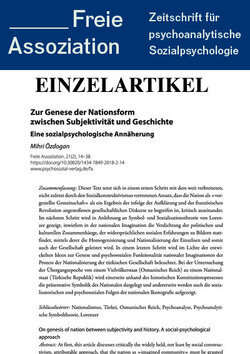25 Seiten, PDF-E-Book
Erschienen: August 2019
Bestell-Nr.: 21263
https://doi.org/10.30820/1434-7849-2018-2-14
abonnieren
Mihri Özdogan
Zur Genese der Nationsform zwischen Subjektivität und Geschichte (PDF)
Eine sozialpsychologische Annäherung
Sofortdownload
Dies ist ein E-Book. Unsere E-Books sind mit einem personalisierten Wasserzeichen versehen,
jedoch frei von weiteren technischen Schutzmaßnahmen (»DRM«).
Erfahren Sie hier mehr zu den Datei-Formaten.
Dieser Text setzt sich in einem ersten Schritt mit dem weit verbreiteten, nicht zuletzt durch den Sozialkonstruktivismus vertretenen Ansatz, dass die Nation als »vorgestellte Gemeinschaft« als ein Ergebnis der infolge der Aufklärung und der französischen Revolution angestoßenen gesellschaftlichen Diskurse zu begreifen ist, kritisch auseinander. Im nächsten Schritt wird in Anlehnung an Symbolund Sozialisationstheorie von Lorenzer gezeigt, inwiefern in der nationalen Imagination die Verdichtung der politischen und kulturellen Zusammenhänge, der widersprüchlichen sozialen Erfahrungen zu Bildern stattfindet, mittels derer die Homogenisierung und Nationalisierung der Einzelnen und somit auch der Gesellschaft geleistet wird. In einem letzten Schritt wird im Lichte der entwickelten Ideen zur Genese und psychosozialen Funktionalität nationaler Imaginationen der Prozess der Nationalisierung der türkischen Gesellschaft beleuchtet. Bei der Untersuchung der Übergangsepoche von einem Vielvölkerstaat (Osmanisches Reich) zu einem Nationalstaat (Türkische Republik) wird einerseits anhand des historischen Konstitutionsprozesses die präsentative Symbolik des Nationalen dargelegt und andererseits werden auch die sozialisatorischen und psychosozialen Folgen der nationalen Ikonografie aufgezeigt.
Abstract:
At first, this article discusses critically the widely held, not least by social constructivism, attributable approach, that the nation as »imagined community« must be grasped as an outcome subsequent to the enlightenment and the social discourses of the French Revolution. In the next step, referring to the symbol and socialization theory in Lorenzer, will be pointed out how far in the national imagination the consolidation of the political and cultural contexts, the contradictory social experiences to images proceed whereby the homogenization and nationalization of one single person and thus the society will be achieved. Finally, the process of nationalization in the Turkish society will be examined in the light of the developed conceptions on genesis and psychosocial functionality of national imaginations. On the one hand by reference to the presentative symbolic of the nation and on the other hand by the socialization and psychosocial consequences of the national iconography an analysis of the transitional epoch from a multiethnic state (Ottoman Empire) to a national state (Turkish Republic) will be presented.
Abstract:
At first, this article discusses critically the widely held, not least by social constructivism, attributable approach, that the nation as »imagined community« must be grasped as an outcome subsequent to the enlightenment and the social discourses of the French Revolution. In the next step, referring to the symbol and socialization theory in Lorenzer, will be pointed out how far in the national imagination the consolidation of the political and cultural contexts, the contradictory social experiences to images proceed whereby the homogenization and nationalization of one single person and thus the society will be achieved. Finally, the process of nationalization in the Turkish society will be examined in the light of the developed conceptions on genesis and psychosocial functionality of national imaginations. On the one hand by reference to the presentative symbolic of the nation and on the other hand by the socialization and psychosocial consequences of the national iconography an analysis of the transitional epoch from a multiethnic state (Ottoman Empire) to a national state (Turkish Republic) will be presented.
Philipp Berg, Markus Brunner, Christine Kirchhoff, Julia König, Jan Lohl, Tom D. Uhlig & Sebastian Winter S. 5–12Editorial (PDF)
Mihri ÖzdoganS. 14–38Zur Genese der Nationsform zwischen Subjektivität und Geschichte (PDF)
Eine sozialpsychologische AnnäherungAyse CavdarS. 40–59The state (of mind) of Dumrul (PDF)
How did a nation lose the plot?Talin SuciyanS. 61–70Anerkennung, aber wie? (PDF)
Schlaglichter auf problematische Aspekte der Anerkennungsdebatte in DeutschlandDaniel KeilS. 72–74Praxis, Säkularisierte Religion und Geschlecht (PDF)
Serhat KarakayaliS. 75–81Zum Status des türkischen Nationalismus (PDF)
Onur ÖzcanS. 81–84Reinszenierung als »Vater der Nation« (PDF)
Leo RoepertS. 84–88Gewaltgeschichte und Nationalbewusstsein (PDF)
Ismail KüpeliS. 88–90Kein Bruch mit den hegemonialen Geschichtsnarrativen (PDF)
Gaye Ilhan DemiryolS. 90–92The tale of Deli Dumrul (PDF)
A house divided against itself?Bülent SomayS. 93–96Deli Dumrul (PDF)
A Comic Relief, But No Laughing MatterSebastian WinterS. 96–99Invented Archetypes (PDF)
Sabri Deniz MartinS. 99–104Das übliche Schweigen und Versäumen (PDF)
Keine deutsche Mittäterschaft laut ArmenienresolutionVolkan CidamS. 104–108Capricho Nr. 43 (PDF)
Emilio ModenaS. 110–1115.000 Gasmasken für Rojava (PDF)
Tom D. UhligS. 112–117Unfreie Assoziationen (PDF)
Melanie BabenhauserheideS. 119–122Rezension von: Sonja Witte (2018). Symptome der Kulturindustrie (PDF)
Mihri ÖzdoganS. 14–38Zur Genese der Nationsform zwischen Subjektivität und Geschichte (PDF)
Eine sozialpsychologische AnnäherungAyse CavdarS. 40–59The state (of mind) of Dumrul (PDF)
How did a nation lose the plot?Talin SuciyanS. 61–70Anerkennung, aber wie? (PDF)
Schlaglichter auf problematische Aspekte der Anerkennungsdebatte in DeutschlandDaniel KeilS. 72–74Praxis, Säkularisierte Religion und Geschlecht (PDF)
Serhat KarakayaliS. 75–81Zum Status des türkischen Nationalismus (PDF)
Onur ÖzcanS. 81–84Reinszenierung als »Vater der Nation« (PDF)
Leo RoepertS. 84–88Gewaltgeschichte und Nationalbewusstsein (PDF)
Ismail KüpeliS. 88–90Kein Bruch mit den hegemonialen Geschichtsnarrativen (PDF)
Gaye Ilhan DemiryolS. 90–92The tale of Deli Dumrul (PDF)
A house divided against itself?Bülent SomayS. 93–96Deli Dumrul (PDF)
A Comic Relief, But No Laughing MatterSebastian WinterS. 96–99Invented Archetypes (PDF)
Sabri Deniz MartinS. 99–104Das übliche Schweigen und Versäumen (PDF)
Keine deutsche Mittäterschaft laut ArmenienresolutionVolkan CidamS. 104–108Capricho Nr. 43 (PDF)
Emilio ModenaS. 110–1115.000 Gasmasken für Rojava (PDF)
Tom D. UhligS. 112–117Unfreie Assoziationen (PDF)
Melanie BabenhauserheideS. 119–122Rezension von: Sonja Witte (2018). Symptome der Kulturindustrie (PDF)

